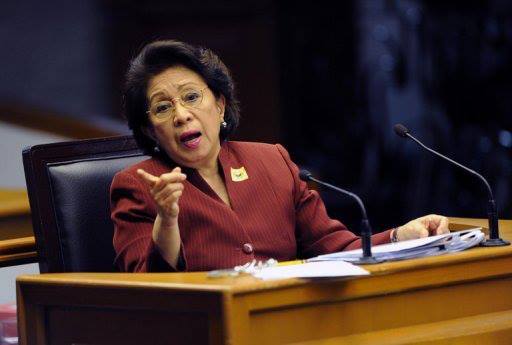
Ombudsman Conchita Carpio-Morales. Photo from Ombudsman Facebook page.
Ombudsman Conchita Carpio Morales will not see the conclusion of the plunder case against President Duterte, his daughter Sara and son, Paolo before she steps down in July from the investigative body that she has presided with professionalism and integrity the past seven years.
But the fact that she has taken up the case and pursued the probe despite heavy pressure from Malacanang is her legacy to the Filipino people.
Morales has stood up to Duterte, whom she is related by affinity (her brother is the father-in-law of Duterte’s daughter, Davao City Mayor Sara Duterte Carpio) in the plunder case filed by Sen. Antonio Trillanes IV in May 2016 citing the 2015 report of the Commission on Audit of questionable disbursement of some P708 million to contractual employees, many of whom were not identified.
Trillanes attached to his complaint Duterte’s bank records which showed his money in hundred millions which were not reported in his Statement of Assets, Liabilities and Networth.
When Solicitor General Jose Calida announced last February that the Ombudsman junked the plunder case against Duterte, Morales immediately clarified that the case was not dismissed. They just terminated the investigation because of the refusal of the Duterte appointee in the Anti-Money Laundering Council to provide them the bank records.
She clarified, “By rule, ‘[a] closed and terminated field investigation is without prejudice to the refiling of a complaint with new or additional evidence.”
She also stoodfirm on the independence of the Office of the Ombudsman when Malacanang suspended her deputy, Melchor Arthur Carandang, who confirmed that the bank documents from AMLAC were “more or less” the same as what Trillanes attached to his complaint. Morales ignored Malacañang’s suspension order.
Morales has started saying her farewells. In her speech last May 24 before the Integrated Bar of the Philippines, Makati Chapter, she enjoined everyone, “especially the legal commune, to remain steadfast and vigilant in asserting full adherence to the rule of law at this time and clime.”
She lamented the silence and complacency amidst assault to the Constitution: “We have been mostly silent and inert.We seem to have grown inured to perennial acts of corruption.What is preventing us from doing something about the situation?Could it be the daily struggle to survive, on the part of the less fortunate?Could it be the comforts of a corner office, on the part of the more fortunate? “
She surmised: “Could it be the persistent manipulation of the public mind by certain drumbeaters that numb the sensitivities of an otherwise freedom-loving law-abiding citizenry? “
She reminded the lawyers: “Lest we forget, government derives its power from the consent of the governed.If we find ourselves continually abused and without recourse, isn’t it because, with our silence and inaction, we gave our consent?
In what many see as reference to the macho Malacañang occupant, Morales said: “Let me underscore that great countries do not need strongmen. They need strong institutions. Great men eventually perish but great institutions outlast them all.By protecting great institutions like the Office of the Ombudsman, you are protecting the people. “

